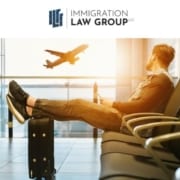On Monday the 22nd of June 2020, President Trump issued a new proclamation (known as Proclamation 10014, or the Suspension of Entry of Immigrants Who Present a Risk to the United States Labor Market During the Economic Recovery Following the 2019 Novel Coronavirus Outbreak) to temporarily suspend the entry of certain foreign workers into the United States. This proclamation halts the issuance of new work visas to aliens, excluding hundreds of thousands of foreigners from obtaining employment in the United States. Additionally, this proclamation extends the already-existing ban on green cards issued outside the U.S. until the end of the year. The previous 60-day ban on green cards issued abroad, imposed in April by the Trump Administration, was expected to expire this Monday.
This executive order is another step in the Trump Administration’s continuous effort to impede immigrants’ entry into the country, masquerading under the premise of freeing up jobs for American citizens, although many businesses and economists have spoken against such measures. The Trump Administration reported that up to 525,000 jobs would be freed for citizens because of this new visa ban.
H-1B visas, used by many tech companies to hire foreign workers with specialized knowledge and training, will be impacted by this executive order. Additionally, H-2B visas for nonagricultural seasonal workers, J-1 visas for cultural exchanges, and L-1 visas for managers/ employees of multinational corporations will also be restricted. Many technology companies will be heavily impacted by such a freeze on work visas.
Certain exemptions for food processing workers (which make up 15% of the H-2 visas) will be made. Moreover, many health care workers related to the coronavirus pandemic will also continue to receive green cards.
This new proclamation will prohibit American companies with global operations, or international companies with U.S. branches, to transfer foreign employees to the U.S. for extended periods of time. Additionally, such an order blocks the entry of spouses of foreigners who are hired by American companies in the United States.
While freezes on visas issued abroad will take effect immediately, other changes such as restrictions on asylum-seekers’ work permits will undergo a formal rule-making process during the following months. Interestingly, the Administration has proposed to reconfigure a new method of awarding H-1B visas, which are capped at 85,000 a year, so that they are awarded by highest salary, rather than by lottery. Already, companies such as Amazon, Google, and Twitter have spoken out against the Administration’s new restrictions.




